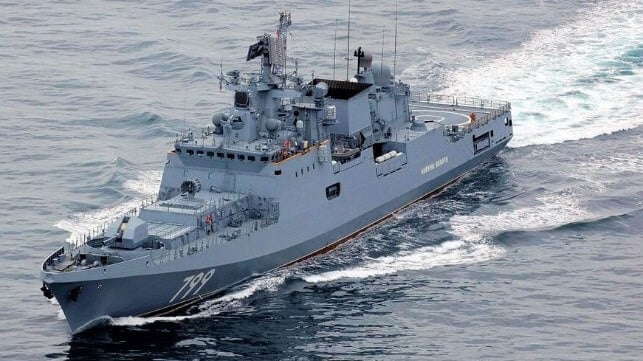Russian Navy "Missing" From Sea of Azov

After a series of Ukrainian attacks on the Kerch Strait ferry service, the Russian Navy has stopped patrolling the Sea of Azov altogether - at least temporarily, according to the Ukrainian Navy.
"There is no longer a single Russian warship in the Sea of Azov. It seems that they began to suspect something," said Ukrainian Navy spokesman Dmytro Pletenchuk. "They took a map and a compass and decided that it was probably not very safe to stay there."
Pletenchuk claimed that the absence of Russian warships was primarily due to the successful attack on the railway ferry at Kavkaz, just north of the Kerch Strait Bridge. Ukrainian forces attacked the ferry terminal at the Russian port last week, killing at least one person, according to the region's governor. The Ukrainian Navy claimed responsibility for the attack and said that it caused "significant damage" to the third and last remaining rail ferry in the region.
The Ukrainian Navy confirmed that Russian ships were still "missing" from the Sea of Azov as of Sunday, and that there was only one Russian missile-capable warship operating in the Black Sea.
Ukraine has destroyed, damaged or sunk about 15 Russian Navy warships and auxiliaries in the Black Sea Region, plus the three ferries at Kavkaz and an assortment of smaller craft. The majority of the strikes occurred at ports and harbors on the Russian-occupied Crimean Peninsula. In response, the Russian Navy has withdrawn its remaining vessels to the safety of Novorossiysk and - until recently - the Sea of Azov. Just last month, the Black Sea Fleet ordered its large surface combatants to transit north through the Kerch Strait and mass off the coast of Mariupol for exercises; Ukraine claimed that the location was selected for safety from missile and drone-boat attacks.
Fleet renewal
On Sunday, in commemoration of Russia's annual Navy Day, Russian presidential advisor Nikolai Patrushev told a local media outlet that the service is on the verge of a great renewal.
"As a great maritime power, Russia should possess a powerful navy comprising ships designed to accomplish missions in close-in and distant maritime and oceanic areas," he told Rossiyskaya Gazeta. "A new stage of the development of the [Russian] Navy is actually beginning."

that matters most
Get the latest maritime news delivered to your inbox daily.
Those "distant maritime and oceanic areas" include the Americas. On Saturday, the patrol ship Neustrahimiy and training vessel Smolniy called in Cuba, marking the second time that Russian warships have visited Havana this year.
Cuba is strategically positioned as the only Russian ally within ready striking distance of the United States mainland. On Sunday, Russian President Vladimir Putin warned that Russia would station missiles within range of Western nations if the U.S. deployed its most capable missile systems to Germany. The White House recently authorized deployment of Tomahawk and SM-6 missiles to German soil by 2026, as a stepping-stone towards eventual deployment of hypersonic weapons. Putin compared the decision to the deployment of the U.S. Army's Pershing II missile to West Germany in 1983 - itself a response to the Russian deployment of a similar missile in 1977.
